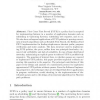Free Online Productivity Tools
i2Speak
i2Symbol
i2OCR
iTex2Img
iWeb2Print
iWeb2Shot
i2Type
iPdf2Split
iPdf2Merge
i2Bopomofo
i2Arabic
i2Style
i2Image
i2PDF
iLatex2Rtf
Sci2ools
HIPC
2007
Springer
2007
Springer
Accomplishing Approximate FCFS Fairness Without Queues
First Come First Served (FCFS) is a policy that is accepted for implementing fairness in a number of application domains such as scheduling in Operating Systems, scheduling web requests, and so on. We also have orthogonal applications of FCFS policies in proving correctness of search algorithms such as Breadth-First Search, the Bellman-Ford FIFO implementation for finding single-source shortest paths, program verification and static analysis. The data structure used to implementing FCFS policies, the queue, suffers from two principal drawbacks, viz., non-trivial verifiability and lack of scalability. In case of large distributed networks, maintaining an explicit queue to enforce FCFS is prohibitively expensive. The question of interest then, is whether queues are required to implement FCFS policies; this paper provides empirical evidence answering this question in the negative. The principal contribution of this paper is the design and analysis of a randomized protocol to implement app...
Distributed And Parallel Computing | FCFS Policies | HIPC 2007 | Program Verification | Shortest Path |
Related Content
| Added | 16 Aug 2010 |
| Updated | 16 Aug 2010 |
| Type | Conference |
| Year | 2007 |
| Where | HIPC |
| Authors | K. Subramani, Kamesh Madduri |
Comments (0)

